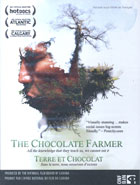
The Chocolate Farmer 2010
Distributed by National Film Board of Canada, 1123 Broadway, Suite 307, New York, NY 10010; 800-542-2164
Producer n/a
Directed by Rohan Fernando
DVD, color, 52 min.
Sr. High - General Adult
Agriculture, Native American Studies, Environmental Studies
Date Entered: 02/03/2012
Reviewed by Oksana Dykyj, Head, Visual Media Resources, Concordia University, MontrealIn southern Belize, farmers develop a sense of capitalism while still trying to preserve ancient Mayan traditions. The film follows the Pop family and a number of their children: one daughter wants to study art; one son attempts to strike out on his own after dropping out of college during his first semester but fails and returns home; another son drinks and gets into brawls, which causes his father to have to borrow money to pay for medical bills. The father works his land and the mother cooks the meals while taking care of the children.
We are told that the past ways of communal farming and of close communities are quickly disappearing but that a farmer can only lay claim to his land after many years of paying a monthly lease to the state of Belize. There is a clear dichotomy in the values of the family and its community. On the one hand, Eladio Pop complains that education causes people to be enslaved by the employers they seek out because they no longer want to stay to farm and complains that education has caused children to become lazy drunkards, and on the other hand both he and his wife want their daughters to go on and have careers in nursing or in areas where they could be independent. Fifty-year-old Eladio Pop is articulate and educated, but he has worked all his life and has no savings. The only way he makes money is by taking eco-tourists and showing them around. He loves his farm and it appears that one of his sons does as well. Sadly, his old way of life is dying out and he knows it.
The film raises points about the superficiality and ambivalence of eco-tourism, which unfortunately, as it is depicted in the film, is a way for Southern Belize farmers to make money from unconsciously condescending tourists but fails to provide enough insight about it from Eladio Pop, making it a kid of snapshot of where things are at the time the film was made. The Chocolate Farmer is recommended for providing a very basic glimpse of the current changing values of indigenous people in Belize. It does not attempt to go beyond the simple boundaries it has set up for itself and confines its points to observation. It may not provide additional information to what has already been said in other films about this topic, but it presents engaging and thoughtful remarks about life from its main protagonist.